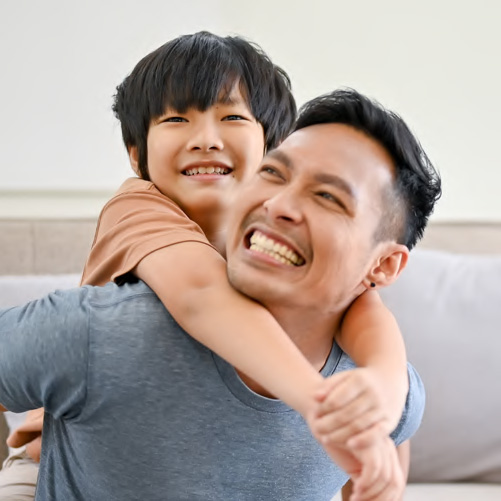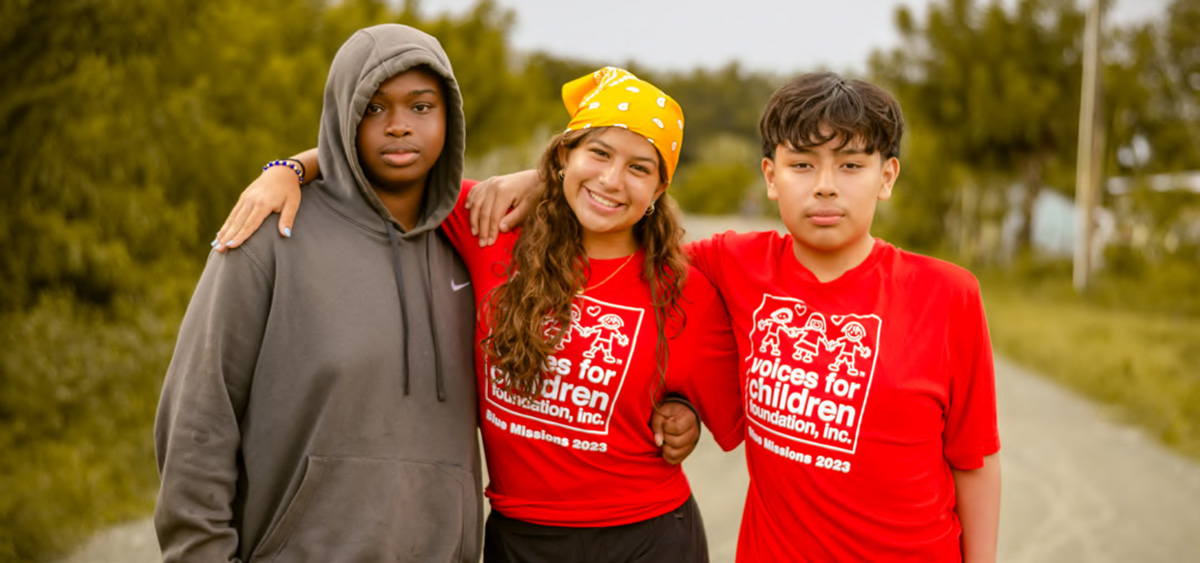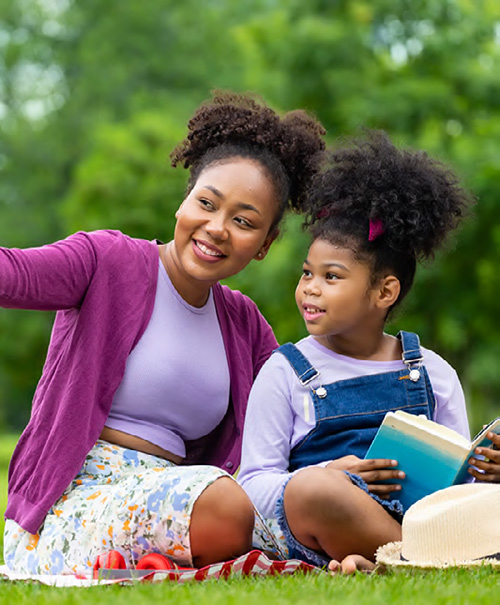Miami GAL Office Accomplishments
Child Advocacy
Representing each of 2,140 children, youth and young adults (to be further referred to only as children) in tandem with GAL Office attorneys, and with ongoing GAL Office child advocacy managers’ supervision and guidance, GAL volunteers and staff advocates ensured that each child had a voice in court that represented and advocated for his or her best interests. 2022-2023 outcomes exceeded all projections and include the following:

1. 99% of all dependent children represented by GAL Office staff and volunteer advocates vs 95% proposed whose cases closed (572 of 576) achieved permanency through reunification with biological parent(s) who have completed treatment/services, adoption, legal permanent guardianship or independent living status in a safe and stable environment as documented by official Motions to Discharge filed in Dependency Court.
2. 92% of all dependent children in Kindergarten to 12th grade represented by GAL Office staff and volunteer advocates vs 85% proposed continued their education as documented by GAL Monthly Reports or official school transcripts.
3. An average 1,284 children under Dependency Court jurisdiction vs 1,200 proposed were represented by GAL Office staff and volunteer advocates at any given time for a total of 2,140 children and youth represented throughout 2022-2023 vs 2,000 proposed as documented by official Dependency Court Hearing Reports.
Child Permanency
The GAL Office has consistently increased the number of dependent children that achieve permanency. With an impressive 99% or 576 children whose cases closed achieving permanency in 2022-2023 vs 98% or 529 in 2021-2022, Voices and the GAL Office again had a positive impact on the required coordination of public systems that historically though unintentionally impeded children’s expeditious achievement of permanency despite statutory mandates. In 2022-2023, targeting the youngest children languishing in the dependency system to reduce their trauma and increase their chances for positive child development remained a priority.
Aware that by five years of age, 90% of all human brain development occurs, children develop their initial and essential sense of trust that enables them to form attachments with others and because the largest group of children entering dependency and subsequently represented by GAL advocates has always been 0-5 year-olds, a permanency specialist position was developed and successfully piloted in 2020-2021 and 2021-2022. The permanency specialist position was specifically designed to expedite permanent placements to provide stability and increase sibling attachments for these youngest children. Exclusively focused on eliminating barriers so permanency could be achieved as quickly as possible, the permanency specialist identified children who were languishing and helped eliminate the obstacles that thwarted the progress of GAL advocates, case managers/social workers and GAL attorneys. In 2022-2023, Voices and the GAL Office secured continued funding for this now essential position as the goal was and remains to reduce the number of 0-5-year-olds of all ethnicities and their siblings that languish in the child welfare system and to minimize sibling separation.
In 2022-2023, the permanency specialist (PS) achieved the following outcomes:
1. 370 children ages 0-5 years of all ethnicities and their siblings vs 350 proposed had a total of 1,296 GAL Team and intensive staffings convened plus follow-up, as needed, was conducted to identify and eliminate all obstacles to permanency as documented by GAL Office Case Reports, Hearing Reports and Dependency Court Motions.

2. 161 dependent children ages 0-5 years of all ethnicities plus 57 of their siblings for a total of 218 dependent children (vs 150 proposed and a total of 205 served in 2021-2022) received enhanced legal advocacy with requests for status hearings and filing motions/orders for cross-agency staffings to eliminate barriers and achieve permanency as documented by GAL Case Reports and Dependency Court Motions to Dismiss.

3. 85% of siblings not placed together were provided with 60-day staffing reviews to identify/eliminate barriers as proposed so that siblings were placed in the same home and, when impossible, were provided with court-ordered regular visitations as documented by GAL 60-day staffing review reports.

The above results provided the immediate benefits of increased stability and sustained sibling ties. Long-term positive impacts on children’s social and emotional development are also expected. This is because expedited permanency prevents further trauma and instability caused by placement and other changes, including sibling separation or decreased contacts, which are more likely to occur when children languish in the child welfare system.
With the achievement of GAL representation for 100% of all Miami-Dade dependent children, Voices has continued to prioritize more expeditious permanency for children so their chances for success would be improved and there would be an end to the intergenerational cycle of abuse. In 2022-2023, Voices secured funding for the GAL permanency specialist through October 31, 2024 and expects to continue to fund this vitally important position indefinitely. This full-time professional with extensive experience as a child advocate and considerable knowledge about all facets of the child welfare system has effectively identified and helped mitigate all barriers to permanency for dependent children ages 0-5 years of all ethnicities and their siblings. Voices is hopeful that other Circuits of the Statewide Guardian ad Litem Office will choose to replicate this position within their child advocacy operations.
Independent Living Project

Despite research on best practices demonstrating that for many reasons, youth benefit from extended foster care and that this increases their chances for effectively transitioning from dependency to independent adulthood (also preventing the negative outcomes that many former foster youth experience), the judicial system has historically only started this transitioning process at 17.3 years of age. Also proven is that waiting until dependent youth are age 17.3 years to begin focusing on what they will need to have in place by age 18 almost guarantees that they will be unable to provide for themselves once on their own. This remains due to insufficient time for overburdened child welfare system CWS employees to effectively engage youth in creating and implementing realistic transition plans as the myriad services they need remain inaccessible from overburdened government agencies. This nine-month race to achieve what most non-dependent youth in stable homes begin years before and continue for years after their 18th birthday sets dependent youth you for frustration and disappointment. This usually results in their desire to leave foster care as soon as they turn 18 despite lacking the resources needed to support themselves instead of consenting to extended foster care, which provides youth with numerous benefits.
As reported in Voices 2021-2022 Final Report, Voices and the GAL Office built on the success of the permanency specialist (PS) and secured funding to implement a similar approach to assisting youth "aging out" of the child welfare system. In 2022-2023, the laser focus of an independent living specialist continued to significantly enhance the committed efforts of GAL advocates by identifying the barriers to dependent youth ages 16 years and up so they could begin to successfully transition to adulthood by having barriers removed or mitigated. This full-time independent living specialist, also with extensive CWS experience and knowledge, exclusively focused on identifying and eliminating barriers so that 130 dependent youth ages 16 years and older could successfully create and implement their own individualized transition plans to adulthood. Collaborating with GAL advocates and GAL attorneys, other CWS staff, and those from various youth services organizations, the independent living specialist also ensured youth were informed about the benefits of extended foster care and were able to access all appropriate State entitlements.
In 2022-2023, the independent living specialist (ILS) exceeded all proposed objectives and achieved the following on behalf of youth ages 16-23 years with a case plan goal of APPLA:
1. 97% or 179 of the actual 183 youth in foster care vs the proposed 82% of 130 youth were enrolled in a high school or GED program, vocational program or college or were employed full-time as measured by GAL Program Office Files.

2. 93% or 171 of the 183 youth in foster care vs the proposed 90% of 130 youth did not have open involvement with the Juvenile or Criminal Justice System as measured by dependency and juvenile court files.

3. 98% or 180 of the 183 youth in foster care vs the proposed 65% of 130 youth elected to extend foster care jurisdiction as measured by GAL court files.

Working with any teen population is challenging but working with dependent teens is significantly more difficult because these youth experienced trauma with their biological parents and have learned to distrust adults. Recognizing that developing a trusting relationship with every youth must come first, the ILS demonstrated her genuine concern for each one’s welfare by helping each one address his/her individual needs and interests.
The ILS coordinated with the GAL Office and case management agencies year-round to ensure that every youth’s Social Security application was submitted six months before their 18th birthday so there was no lapse in their receipt of this essential monthly income. She worked diligently to get to know each youth, helping them develop realistic Transition to Adulthood Plans tailored to each youth’s strengths, interests, talents and motivation to work hard. The ILS collaborated with Educate Tomorrow and helped chaperone 40 dependent youth on a week-long King’s College Tour of Florida colleges and universities during Spring Break 2023.
The ILS’ patience, respect and cultural humility have enabled her to effectively connect with each youth, so they are receptive to her assistance. Her good sense of humor and use of interactive texts and emails to communicate with youth have also facilitated increased engagement in the positive steps needed for them to succeed. The addition of the ILS to the GAL Office is expected to prevent negative outcomes associated with being in foster care, benefiting the individual youth and the community at large, as these young adults are more likely to become productive, healthy members.
In 2022-2023, Voices also secured funding for the GAL ILS through October 31, 2024 and expects to continue to fund this essential position indefinitely. Voices is hopeful that other Circuits of the Statewide Guardian ad Litem Office will also choose to replicate the ILS position within their child advocacy operations.

GAL Volunteer Recruitment
To provide community-wide recruitment, training and screening of volunteer child advocates, the GAL Office achieved the following in 2022-2023 with Voices’ support:

1. A total of 107 newly certified GAL volunteers were recruited, screened, completed the required 30-Hour Initial GAL Training, and were assigned to represent dependent children in Miami-Dade County. All received educational advocacy training as part of their initial training to enable them to assist children to meet age-appropriate educational objectives.
2. A total of 552 GAL volunteers represented dependent children in 2022-2023, including 62% primarily ethnic minorities with 36% Hispanic; 14% Black, non-Hispanic; and 12% other/multi-ethnic. The remaining 38% were White, non-Hispanic. A total of 97 or 18% of all GAL volunteers were men and 455 or 82% were women. As always, Voices and the GAL Office aimed to increase the diversity of volunteer advocates and the number of male advocates to best reflect the demographics of and relate to Miami-Dade County’s dependent children.
3. In addition to the required 30-Hour Initial GAL Training, 51 volunteers were trained and given information and materials to serve as Certified Educational Surrogates for Miami-Dade Public School children. These volunteers advocated for children represented to ensure each child received the appropriate grade- and achievement-level placements and that the educational needs of children and youth they represented were met with tutoring, mentoring and/or via MDCPS’ Exceptional Student Services programs, as appropriate for each child.
4. A total of 14 GAL volunteers received training in the Commercial Sexual Exploitation of Children to enable them to effectively advocate for human trafficking victims.
The impact of GAL advocates on the lives of the children served is captured in this quote from a foster parent:




